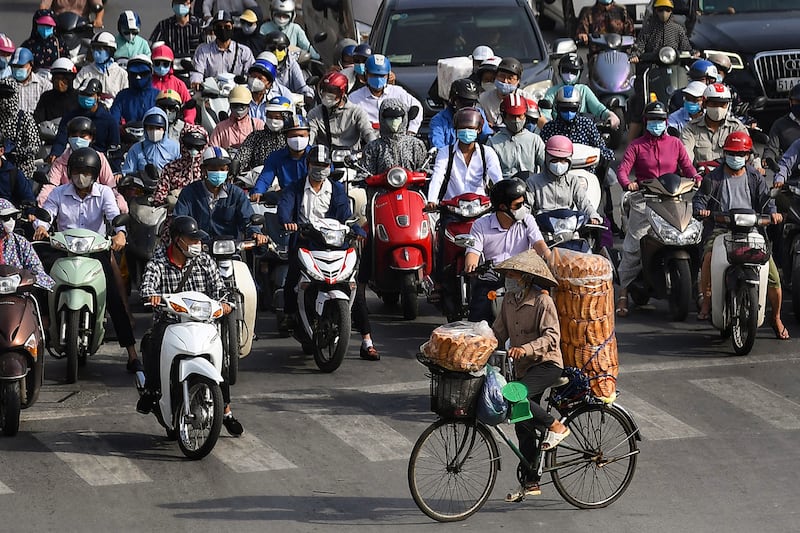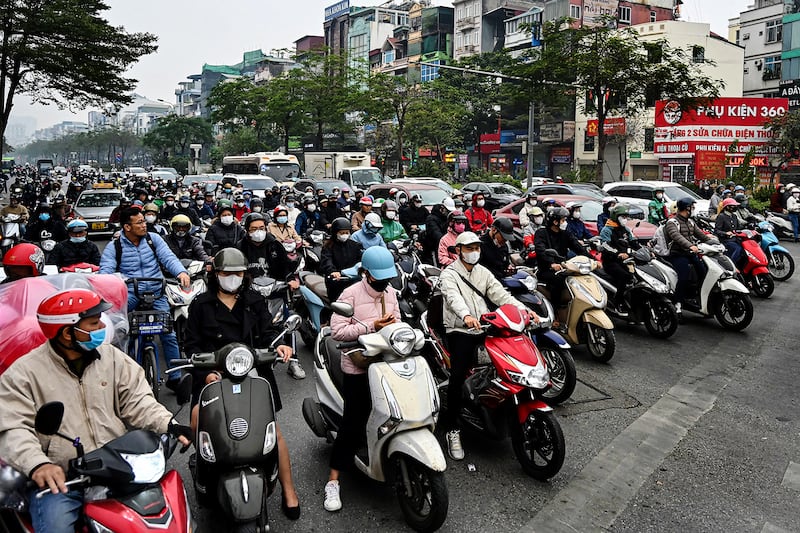As one theory goes, as a country becomes wealthier, its streets should become more orderly and safe. Or to use the favored word of the Vietnamese Communist Party, the roads need to become more “civilized.” Any visitor to Hanoi or Saigon, however, cannot help but notice that economic development hasn’t been coupled with vehicular orderliness. At least, that was until the authorities introduced a new edict at the beginning of January. Traffic fines have since risen tenfold, with the biggest tickets over US$1,500. Cars that don’t stop at red lights can be fined US$780, up from US$230 last year. Fines have also been increased for drunk drivers, those who park on the pavement, those speeding, etc, etc. According to local media, opening a car door in an unsafe manner will now result in a penalty of US$860, up from US$23.

One hears that this is having the desired effect, although some newspapers have given copious inches to the grumblers. Most complaints are about the congestion the changes have naturally produced, notably because many motorists are now being over-cautious. Yet there are also accusations that the authorities are simply trying to funnel more “tea money” into the pockets of the underpaid police. “The police just want to take as much money as they can,” a moto-taxi driver told the New York Times. This clearly wasn’t the motivation behind the edict, although it’s certain to be a consequence, so the authorities will struggle to convince nay-sayers of the distinction between causation and correlation. It is true that the fines are too expensive, which means they can only be temporary. And the Communist Party’s claims that this scheme isn’t a draconian crackdown haven’t been helped by the authorities arresting numerous social media users for making rather bland criticisms of the new edict.
‘Civil society by motorbike’
On the other side of the ledger, several Vietnamese acquaintances have told me that they’re rather pleased with the increased fines if they decrease the odds of being knocked down when crossing the road or when walking along a pavement. Many say they would be happy to sit in traffic for slightly longer if it means their children are less likely to die on a scooter. One correspondent reckons that success on the roads might be followed up by the authorities cleaning up the pavements and store fronts, removing the weeds and repainting the walls. Indeed, for all the negativity, one ought not to romanticize disorder and uncleanliness. That said, like with the occupant of an illegally built shanty staring down a local council’s bulldozers, one feels an instinctual sympathy for a people who are now being punished for having previously been forced to make up their own rules at a time when the politicians and elites had no interest in doing so. Civil society by motorbike; a public square of Honda Waves. Yes, Vietnam’s city streets may have been somewhat lawless, but they were far from anarchic. They were self-policed by informal rules, a social pact between drivers unmediated by the state, which everyone understood and which made driving bearable.
RELATED STORIES
Residents of Vietnam’s capital object to planned hike in traffic fines
Hanoi considers doubling traffic fines
Vietnamese man fined for social media comments on new hefty traffic fines
If the communist government now says it wants to “civilize” the streets, the average road user is justified in asking where the authorities were for the past four decades. Why were the police content to collect petty bribes and not properly enforce the laws up until now? Why has almost every public transport project been dogged by chronic delays and graft? As for the people themselves, the middle classes may want the streets to be safer and cleaner and can afford the delays and fines needed to manufacture this, yet for those for whom an extra ten minutes in traffic means the difference between eating two or three meals a day, the manifestation of “civilization” may simply mean being more hungry. The Communist Party still has visions of a classless society, but class divisions will only become more pronounced as the rich grow richer and the poor must suffer the consequence of the rich’s changing mores and desires.
Moreover, if I were Vietnamese, I would be peeved by the tone of the Communist authorities. Making traffic orderly is, they say, a fundamental part of the Communist Party’s efforts to make society more “civilized.” But, for the most part, this mission civilisatrice — a term used to describe the political rationale for the colonization of an indigenous group — seems to be for foreign consumption and foreign comparison. “In the past, many countries faced chaotic traffic and widespread littering … Vietnam is now following a similar path to build a more civilized society,” Tuoi Tre, a newspaper, informs us. Accepted, but the howl of ‘Why can’t we be more like Singapore?’ is always preceded by a self-loathing motive.
Change from the bottom up
Whatever the motivation, though, it is uncertain whether the Vietnamese authorities can actually “civilize” the motorists. For decades, Vietnam’s traffic has been something of a parable not only of the country’s from-the-gutter-up species of capitalism, but also of the gulf between how its authorities and those of other authoritarian states deal with disorder. As the Economist noted a few years ago, “Whereas smog-fighters in Beijing have begun closing factories and restricting car usage, bigwigs in Hanoi still struggle to prevent scooter-riders from parking on the pavements.” Vietnam may be a one-party state, and an increasingly repressive one, but the sight of self-governed and un-policed streets has long been an indication that the authorities are laissez-faire over areas where they are weak. Indeed, a history of Vietnamese capitalism would have to include the thesis that much of the development happened in opposition to government edicts.

One question is how to tell whether the latest traffic edict has been a success or not. By the reduction in traffic-related accidents or deaths? By the severity of the fines imposed? A danger is that it becomes a numbers game. On the other hand, there’s a risk that conformity with the law only lasts for as long as the police keep issuing crippling penalties, which may not be for too long. I hear the police in Ho Chi Minh City are again allowing motorists to turn right at red lights at some intersections. When, in 2007, the government introduced a regulation requiring motorbike drivers to wear helmets, most responded with ironic obedience—they wore cheap, light-weight baseball-cap headgear that were in keeping with the letter of the law but not the spirit.
No country’s police can enforce traffic regulations alone; it requires a majority of drivers to accept that laws about speeding or stopping at traffic lights or parking only in parking zones are more beneficial for the whole than the informal codes that regarded these as suggestions to be ignored when convenient. As has always been the case in Vietnam, any lasting change will have to come from the bottom up.
David Hutt is a research fellow at the Central European Institute of Asian Studies (CEIAS) and the Southeast Asia Columnist at the Diplomat. The views expressed here are his own and do not reflect the position of RFA.
